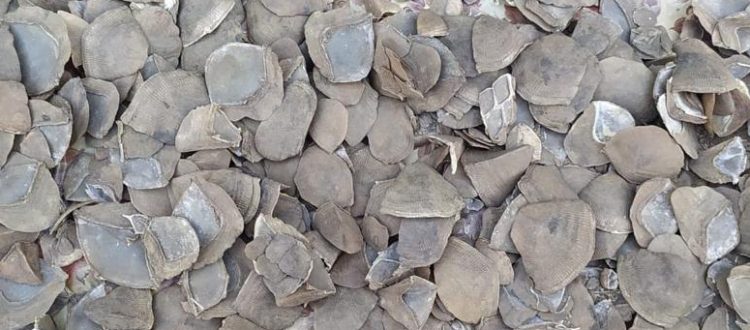Combating Illegal Wildlife Trade – 2022 at a glance
The widespread Illegal Wildlife Trade (IWT) doesn’t just have a negative impact on the world’s most charismatic species such as elephant, and tigers but also targets the lesser-known species, like the pangolin, monitor lizard (Varanus bengalensis), and star tortoise (Geochelone elegans), to mention a few.
In the year 2022, the WTI-WCCD team assisted enforcement agencies to conduct 31 enforcement operations, of which 10 operations were undertaken internationally. There were a total number of 66 wildlife traffickers arrested for their allegiance and involvement in the world of wildlife trade. This year has been crucial for the WTI-WCCD team due to the expansion of the intelligence network across national borders to involve international stakeholders to curb transnational organized crime.
In the efforts to achieve this, the enforcement agencies internationally incarcerated 17 wildlife traffickers from countries like Malawi, Uganda, Indonesia, and Cameroon. For instance, due to information obtained from Facebook, 36.4 kg of raw ivory was obtained from Malawi on July 17, 2022. During an international coordination between World Parrot Trust, Conservation Congo and Uganda Wildlife Authority, 122 live African Grey Parrots (Psittacus erithacus) were rescued in Uganda. The identification of a plausible source and collection as well as verification of the information plays a crucial role in unfolding the dark world of IWT. In terms of social media, Facebook, WhatsApp, and YouTube provided the majority of the information.
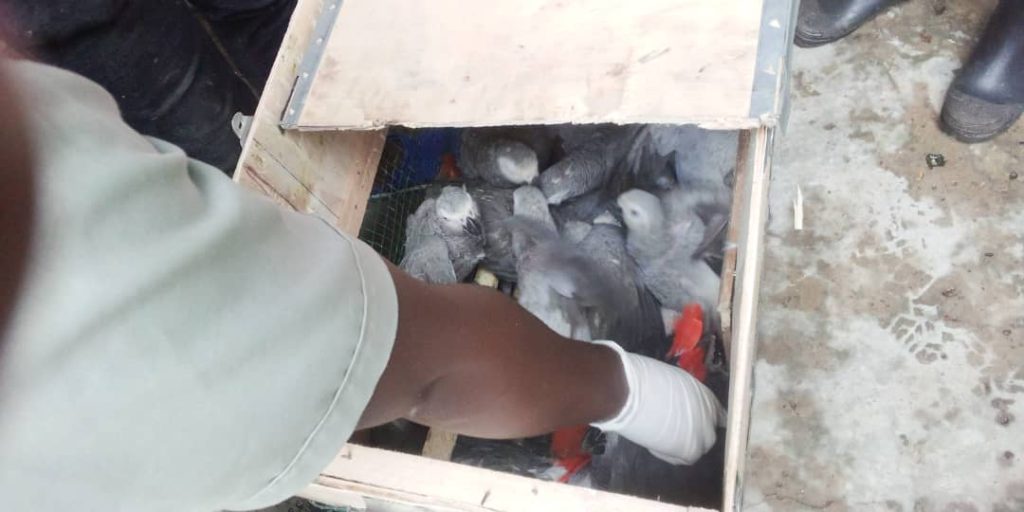
Seizing the illegal consignment of African greys in DRC | Photo WPT
Pangolin trading channels have posted videos on YouTube depicting the horrible process of capturing, torturing, skinning, and selling these animals. WTI’s cyber spotters reported more than 35 of these YouTube channels, and assisted in getting them removed from YouTube, thus contributing a noteworthy victory in the fight against IWT. On Facebook, online wildlife trafficking remains unperturbed in a broad daylight. Wildlife traffickers list their articles derived from wild animals such as pangolin scales, ivory artefacts and exotic pets in public groups, putting them up for sale at exorbitant prices and then continuing their deals in the comments sections thereafter. It has become prevalent over the few years that social media websites are home to private groups wherein the illegal sale of endangered plants and animals is continuing unabated. Wildlife traffickers have unparalleled access to a global market through social media, which also provides them with security of hiding their identity and continuing anonymity.
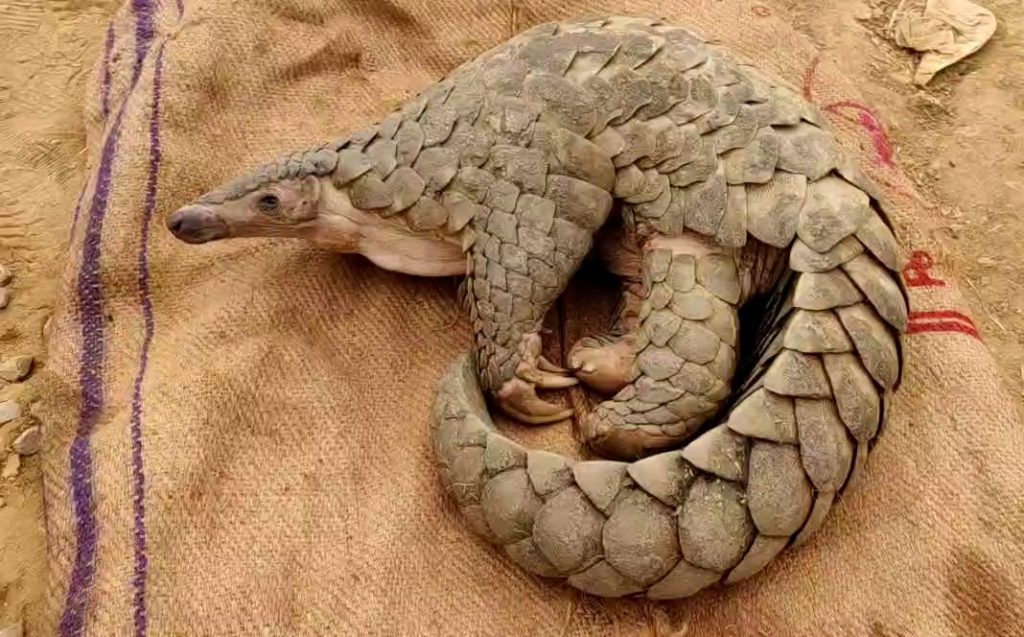
Indian pangolin rescued from traffickers in Chhattisgarh | Photo by Chhattisgarh Forest Department
In order to tackle this, WTI developed and launched Cyber HAWK, a mobile application app to report online and offline wildlife crime in 2019. The main reason for introducing the app was to encourage the participation of the general public who may come across wildlife trafficking in their everyday life. In 2021, such crucial tip-offs resulted in 12 enforcement operations in 12 months – an operation every month! As a result, nearly 300 kilogram of pangolin scales, 38 pangolin claws, 7 pangolin skins and 5 live pangolins were seized. Presently, there are 153 cyber spotters spread across 23 different states in India. Cyber spotters are a part of dedicated team who identifies and alerts the IWT which allows the WTI-WCCD team to interrogate into the situation. To be a part of the CYBER SPOTTER NETWORK, download the Cyber HAWK mobile application from Google Play Store.
In India, the most number of enforcement actions were from Maharashtra and Uttar Pradesh contributing to almost 50% of all the wildlife crime cases. WTI with the help of Forest Department has also done enforcement operations in Karnataka, Chhattisgarh, Kerala, Madhya Pradesh and Arunachal Pradesh. Various articles of 18 different species were seized including 3 different species of Pangolin namely Indian Pangolin (Manis crassicaudata), Sunda Pangolin (Manis javanica), and Giant Pangolin (Manis gigantean). The quantity seized from the critically endangered Sunda Pangolin this year was 187.9kgs of scale, 2 Live Pangolins and 1 Dead Pangolin while 24.6kgs of pangolin scales were seized from Indian Pangolin which is also an endangered animal. Scales of Pangolin, spotted deer (Axis axis) skin, Sambhar deer (Cervus unicolor) meat, Common Leopard (Panthera pardus) skin and nails, Ivory raw and ivory artefacts, Hatha Jodi – genitals of Monitor Lizard (Varanus bengalensis), Indian Grey Mongoose (Herpestes edwardsii) brushes are just a few noteworthy articles which were seized last year.
Species listed as Appendix I in the CITES (Convention on International Trade in Endangered Species of Wild Flora and Fauna) were the most abundant accounting for almost twice the amount of seizures this year. According to CITES, Appendix I includes species threatened with extinction. Wildlife traffickers are able to get past the heightened rules and yet manage to hunt or poach these animals. The fact that IWT is seen as an organized crime tied to a wide range of illicit operations, including fraud, corruption, and money laundering, as well as the transnational trafficking of drugs, weapons, fake commodities, and people through multiple networks, may be one of the main causes. Lastly according to the IUCN Red List, Critically Endangered species accounted for 5.6%, the Endangered species accounted for 33.3%, Vulnerable 27.8%, Near Threatened 11.1%, Least Concern 16.7%, and Data Deficient 5.6%.
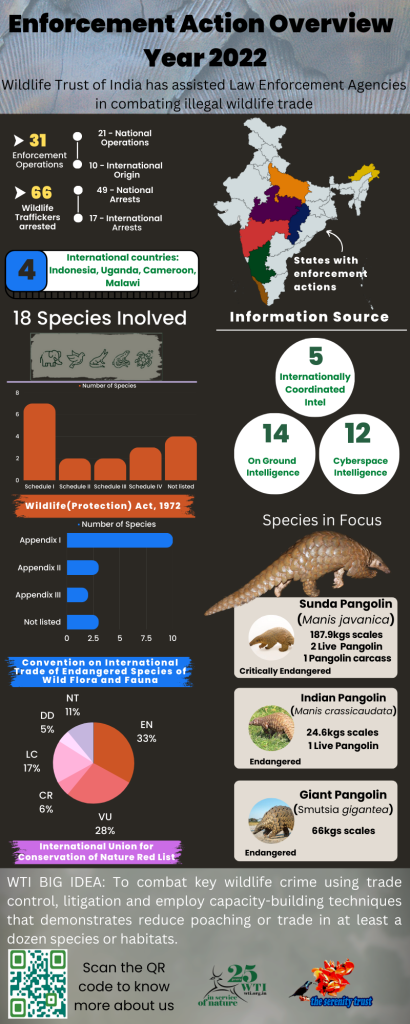
Combatting IWT in 2022
The devastating effects of the coronavirus (COVID-19) outbreak on both public health and the global economy serve as a stark reminder of how vital it is to take steps to reduce the likelihood of another zoonotic pandemic. A fundamental shift in how we interact with nature is necessary to lessen the possibility of another viral spillover affecting the entire earth. In order to achieve this, it is necessary to reduce human interaction with wild animals and wild areas, eliminate viral transmission hubs, such as unhygienic commercial wet markets for wild animal meat and live animals, improve monitoring of legal trade in wildlife, tenaciously suppress illegal and unsustainable trade in wildlife, and protect natural habitats.
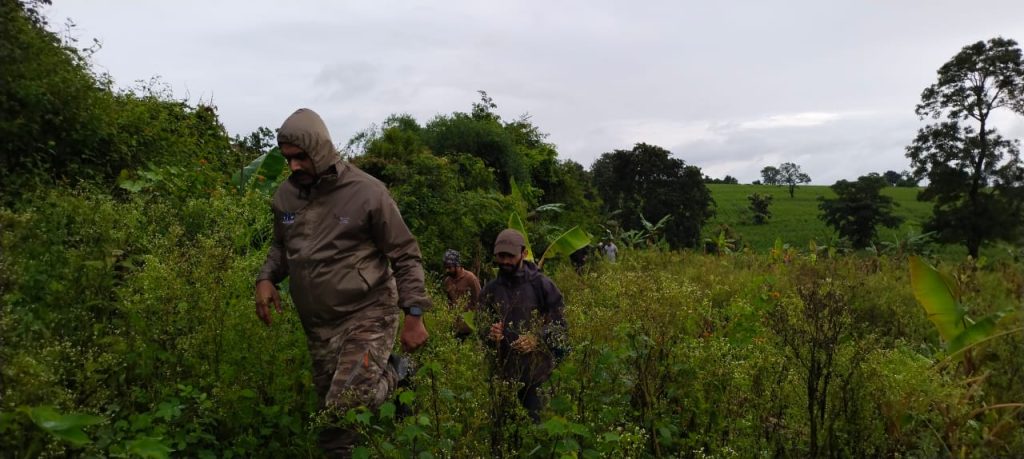
Anti snare walk in Nagarhole NP | Photo by Mahima Sharma
To a large extent, unabated poaching, trafficking, and the unlawful movement of numerous protected species and their products across national, regional, and international borders still persists. To tackle the illegal wildlife trade, we are focusing our efforts on supporting the team of forest rangers, exposing the key routes where illegal products are being traded and working alongside the government to improve the regulations.

